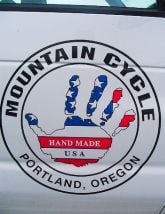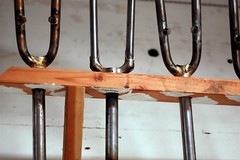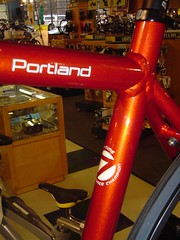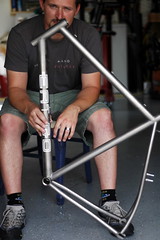[This article by freelance reporter Libby Tucker is the result of a collaboration between BikePortland.org and New Internationalist magazine. The NI — which is based in Oxford, England and has an international circulation of about 65,000 — will publish a version of this story in their June edition as part of a series of articles examining China’s impact around the globe through the culture, politics and finance it exports.]
Shortly after Joe Bike opened in Portland as one of the few American shops outside Los Angeles to sell Flying Pigeon bicycles, an angry cyclist stormed in through the front door and demanded to know why the owner would buy bikes made in China. The country’s poor industrial labor conditions have long drawn scrutiny from international human rights organizations, and Flying Pigeon is a Chinese brand.
“He wanted to know if the Chinese workers have pension plans,” said Joe Doebele, owner of Joe Bike, which opened on Hawthorne Street in November. “The shop’s just getting started. We don’t even have pension plans yet.”
The outburst came as a surprise to Doebele, given that about six to eight percent of Portlanders commute by bike, compared to less than 1 percent nationally, and the city has carefully cultivated its image as a cycling mecca. He assumed it was common knowledge among Portland cyclists that most bicycles, including those sold by the major American brands like Trek, Specialized and Cannondale, come from factories in China and Taiwan.
Why, many local cyclists want to know, can’t Portland itself become a bike production center?
The city’s old-school cycling brigade, however, know that Portland has a long history of failure (re: Mountain Cycle and Kinesis) and success (Sapa Profiles and Chris King Precision Components) in attracting and keeping bike manufacturers. And the question still lingers among Portland bicycle enthusiasts and city officials whether Portland could become the next American city to build a bicycle manufacturing hub that rivals those surrounding companies like Giant and Pacific Cycles in Asia.
“Giant builds a better frame than anyone here. If you’re going to make things in this country and do a good job, the economics are rough.”
— Landon Holt, Tonic Fabrications
“The idea of a Portland-made bike within reach of the average Portlander is a cool idea,” said Landon Holt, a former product manager at Mountain Cycle and co-founder of Tonic Fabrications, a small frame builder in Portland. But, he says, “Giant builds a better frame than anyone here. If you’re going to make things in this country and do a good job, the economics are rough. You’d really have to do something unique, that’s for sure.”
Portland has more than a few hurdles to overcome. It’s been twenty years since most bikes sold in the United States were also made stateside by brands such as Huffy and Schwinn. The industry changed quickly over the past decade as the major brands chased low-cost manufacturing first to Taiwan and then to China. In all, the U.S. imported 200 times more bicycles than it exported last year, with 63,163 bike exports and more than 13 million imports in 2008, according to Bicycle Retailer & Industry News. 95 percent were shipped from China.
Now, the U.S. boasts several large dealers and about 100 mid-size brands that do at least some domestic manufacturing and a growing sector of craft builders that skillfully hand-file a few hundred high-end bikes a year. Portland alone saw the addition of 12 hand-built bike manufacturers in the last two years, a 340 percent increase from the five it had in 2006, according to Portland-based consultants Alta Planning and Design. But most mass-produced, affordable bikes are made in Asia by companies that contract with multiple brands.

manufacturing back to Taiwan
in 2006.
The factors that favor manufacturing in Asia are changing, however, and the trade imbalance is about to shift again, says Jay Townley, a prominent industry analyst and 52-year veteran of the bicycle industry based near Madison, Wis. The need for cheap labor has declined with automated factories, rising oil costs over the long term make overseas shipping less economical and American retailers want faster turnaround to boost gross margins on their inventory. For these reasons, Townley predicts large-scale bike manufacturing will return to the U.S. “in a bigger way” sometime within the next three years, bringing quality bikes to more mainstream consumers.
“All of the indicators prior to the global economic meltdown were that there was a potential for bike manufacturing to come back into North America,” said Townley. “I still think that’s viable. It’s now a question of how the economy shakes out.”
A recent “buy American” sentiment stemming from the global financial crisis would seem to support new efforts to manufacture within the U.S. Congressional leaders even briefly called for protectionist provisions in an early draft of the $819 billion economic stimulus package, which would have required new transportation projects to use American-made steel and iron. The provision failed, however, and consumers, despite their anger over labor conditions overseas, are still rarely willing to pony up extra cash for American-made products, said Michael Nover, former president of U.S. operations for Kinesis who’s now working outside the industry.
“The last thing I did before leaving Portland was try to get investors for a commuter bike line,” said Nover. “I couldn’t make a good business case to build here.”
Instead, the shift of manufacturing back to this continent will happen because U.S. factories can again compete on price and provide products that the market demands. In the 15 years since Nover moved to Portland, factories have become fully automated so that they employ significantly fewer people who require only a basic level of training. Labor costs have become a small slice of the total cost of bicycle production.
At the same time, bike shops are looking for ways to increase their inventory turnover, getting products on and off the shelves quickly when bikes are in demand. And consumers increasingly want “mass customization”, in which shops provide custom options for mass-produced bikes. These new retailer and consumer demands are difficult for overseas factories to meet with the long lag time and cost associated with what the industry calls putting bikes “on the water”. The move back to America is becoming financially feasible for manufacturers – but only if the location also makes economic sense.
“Manufacturing is manufacturing, It doesn’t matter if people love bikes in a market or not. It has to be somebody that knows how to do it.”
— Jay Townley, bike industry analyst
Portland – bike mecca that it is – will have to work hard to prove it’s the right place for mass production. And the pitch will likely come down to shipping costs, said Hu Tao, chief economist for the Policy Research Center for Environment and Economy with the State Environmental Protection Administration in China and a visiting professor at the University of Oregon. As a port city 100 miles upriver from the Pacific Ocean, Portland manufacturers can readily receive parts and materials from overseas. But Portland isn’t ideally situated as a distribution center for the entire North American market via highways and rail, especially compared to a Midwestern transportation hub like Indianapolis or Nashville.
Though he doesn’t rule out Portland, Townley thinks the next big North American hub will likely be in a large city somewhere in the Midwest or potentially in Mexico’s free-trade zones, which allow duty-free exporting. It also makes the most sense for an established Taiwanese or Chinese company to open a factory because they already understand how to achieve the efficiencies necessary to be profitable. Inefficient plant operation is what killed U.S. bike manufacturing, he said.
“Manufacturing is manufacturing,” said Townley. “It doesn’t matter if people love bikes in a market or not. It has to be somebody that knows how to do it.”
Taiwan’s bicycle industry is a competitive force to be reckoned with. Its tightly clustered, efficient industry has been dubbed the A-team because of its coordinated efforts to assemble parts manufacturers, painters and other industry experts within an hour’s drive of the large assemblers. The industry has become so efficient that some 85 percent of Chinese bike manufacturers have signed onto joint ventures with Taiwanese companies.
“If you’re trying to compete as a bike company for highly educated, technically trained engineers, being in a place that’s good for bicycling is very important.”
— Tim Blumenthal, executive director of Bikes Belong
Despite the challenges, heavyweights in Portland’s bike industry and elsewhere think Oregon would be a logical place for bicycle manufacturing to rise again. It’s not an accident that Trek named one of its bikes the “Portland”; the city’s bike culture is already an inspiration to transportation planners and craft builders worldwide.
“If you’re trying to compete as a bike company for highly educated, technically trained engineers, being in a place that’s good for bicycling is very important,” said Tim Blumenthal, executive director of Bikes Belong, a national nonprofit advocacy group based in Boulder, Colo. “You can draw a more enthusiastic, talented labor force.”
The city, which ranks 13th in the nation for the number of manufacturers, has an established supply chain for metals manufacturers and a growing “bicycle industrial-complex” that could provide the foundation for a large bicycle manufacturer, says Jennifer Nolfi, design and creative services manager for the Portland Development Commission (PDC). Sapa Profiles is a frame builder and subsidiary of one of the largest aluminum extrusion companies in the world, Sapa Group. And Chris King. which relocated to Portland six years ago, is a mid-size manufacturer of headsets, hubs and other bicycle components. In all, manufacturing accounts for 20 percent of the Portland bike industry’s $90 million in economic activity.
Portland has made some strides toward building its bike industry. In June 2006 the Portland City Council officially recognized “bicycle-related industry” as a strategic economic investment that would help the city’s larger goals of promoting bicycling as a transportation mode. And the PDC has since stated its intention to help make Portland the best city in the country for bicycle-related businesses, according to a recent draft of the city’s new bicycle master plan.
But Portland lacks a coordinated effort to promote the industry, instead leaving it to a so-far nonexistent statewide bicycle industry association to promote the sector.
“Having the bike industry be an important employer and sector of our economy fits right in with our vision of Portland as a world-class bicycling city,” said Ellen Vanderslice, project manager of the bicycle master plan update for the Portland Bureau of Transportation. But, she added, the “primary purpose” of the city’s bike plan is to make cycling a “real pillar of our transportation system” and not to build the bike industry.
That leaves it to state officials to sell Oregon as the best location for a large bicycle manufacturer. In the current economy, states are clamoring to bring in new companies and factories, domestic or foreign. And rising transportation costs and increased focus on climate change have the potential to create a much larger U.S. market for mass-produced, low- to mid-range bicycles designed for everyday use.
Oregon’s green business incentives are among the biggest in the nation, with a 35 percent business energy tax credit, for example. And the right combination of tax breaks and other incentives could prove enough to offset shipping costs and other imbalances, remarked Blumenthal of Bikes Belong. If the state rallies behind the effort and attracts a major bicycle manufacturer, perhaps one day the angry cyclist storming into Joe Bike will instead demand to know which Chinese-brand bikes are made in Portland.
— Today, the City Club of Portland will hosts 18 local bike builders and a panel discussion on Portland’s bike movement. The event will be available for download here and will be replayed on Oregon Public Broadcasting tonight at 7:00pm.




